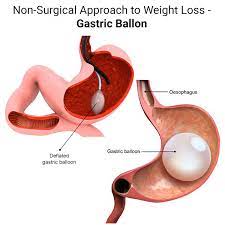Title: Non-Surgical Weight Loss: A Comprehensive Guide to Holistic Well-Being
Introduction:
In the quest for a healthier and more sustainable lifestyle, non-surgical weight loss methods have become increasingly popular. Unlike invasive surgical procedures, non-surgical approaches focus on holistic well-being, incorporating dietary changes, regular physical activity, behavioral modifications, and lifestyle interventions. In this comprehensive guide, we will delve into the various aspects of non-surgical weight loss, exploring its benefits, key strategies, and how it contributes to long-term health and fitness.
Dietary Modifications:
1. Embracing a Balanced and Nutritious Diet:
The foundation of non-surgical weight loss lies in dietary modifications. Adopting a balanced and nutritious diet is essential for achieving and maintaining a healthy weight. This involves incorporating whole foods such as fruits, vegetables, lean proteins, and whole grains while minimizing the consumption of processed foods, sugary beverages, and high-fat snacks. The focus is on consuming nutrient-dense foods that provide essential vitamins, minerals, and fiber, promoting overall health.
2. Caloric Awareness and Portion Control:
Understanding the relationship between calories and weight is crucial for effective weight management. Non-surgical approaches emphasize caloric awareness, encouraging individuals to be mindful of their daily caloric intake. Portion control plays a significant role, promoting the consumption of appropriate serving sizes to prevent overeating. By adopting these practices, individuals can create a sustainable and balanced approach to nutrition.
Regular Physical Activity:
3. The Importance of Exercise in Non-Surgical Weight Loss:
Regular physical activity is a cornerstone of non-surgical weight loss, contributing not only to calorie expenditure but also to overall well-being. Engaging in regular exercise helps boost metabolism, improve cardiovascular health, and build lean muscle mass. From aerobic activities like walking, running, and cycling to strength training exercises, a well-rounded fitness regimen supports weight loss and enhances overall fitness.
4. Finding Enjoyable Forms of Exercise:
To ensure long-term adherence, it’s essential to find enjoyable forms of exercise. Whether it’s dancing, hiking, swimming, or participating in team sports, incorporating activities that bring joy increases the likelihood of maintaining a consistent exercise routine. Non-surgical weight loss encourages individuals to explore different physical activities to discover what suits their preferences and fits into their lifestyle.
Behavioral Changes:
5. Cultivating Mindful Eating Habits:
Addressing the psychological aspects of weight management is a crucial element of non-surgical approaches. Behavioral changes involve cultivating mindful eating habits, which include paying attention to hunger and fullness cues, savoring each bite, and avoiding distractions during meals. Techniques such as mindful eating and intuitive eating promote a healthier relationship with food and prevent emotional eating.
6. Identifying Emotional Triggers and Developing Coping Mechanisms:
Many individuals turn to food as a coping mechanism for stress, anxiety, or other emotions. Non-surgical weight loss strategies involve identifying emotional triggers for overeating and developing alternative, healthier coping mechanisms. This may include engaging in activities like journaling, meditation, or seeking support from friends, family, or a mental health professional.
7. Cognitive-Behavioral Therapy (CBT):
Cognitive-Behavioral Therapy (CBT) is a therapeutic approach that addresses the relationship between thoughts, feelings, and behaviors. In the context of weight loss, CBT can help individuals identify and challenge negative thought patterns related to food and body image. By addressing the underlying psychological factors, CBT contributes to sustained behavioral change.
Lifestyle Interventions:
8. Optimizing Sleep Patterns:
Quality sleep is integral to overall well-being and plays a significant role in weight management. Poor sleep patterns can disrupt hormonal balance, leading to increased hunger and cravings for unhealthy foods. Non-surgical weight loss emphasizes the importance of optimizing sleep patterns, promoting a consistent sleep schedule, and creating a conducive sleep environment.
9. Stress Management Techniques:
Chronic stress can contribute to weight gain and hinder weight loss efforts. Non-surgical approaches include stress management techniques such as meditation, yoga, deep breathing exercises, or other relaxation methods. These practices not only contribute to weight management but also enhance overall mental and emotional well-being.
10. Self-Care Practices:
Incorporating self-care practices into daily life is essential for holistic well-being. Non-surgical weight loss encourages individuals to engage in activities that bring joy, relaxation, and fulfillment. This may include hobbies, spending time in nature, or simply taking moments for self-reflection. By prioritizing self-care, individuals can create a positive and sustainable foundation for their weight loss journey.
Nutritional Counseling:
11. Seeking Guidance from Professionals:
Nutritional counseling plays a vital role in non-surgical weight loss. Seeking guidance from a registered dietitian or nutritionist ensures that dietary changes are both enjoyable and sustainable. These professionals can provide personalized recommendations, create meal plans, and address specific challenges or dietary restrictions. Nutritional counseling enhances the effectiveness of non-surgical weight loss by providing expert guidance tailored to individual needs.
12. Customization to Individual Preferences:
Non-surgical weight loss strategies can be customized to individual preferences, dietary requirements, and fitness levels. This customization increases the likelihood of adherence to the weight loss plan, making it more realistic and achievable. By tailoring the approach to individual lifestyles, individuals are better equipped to make lasting changes that support their overall well-being.
Medical Supervision and Medications:
13. Considerations for Medical Support:
For individuals facing obesity-related health issues, medical supervision and prescription medications may be considered as part of a non-surgical weight loss strategy. These interventions are typically prescribed by qualified healthcare professionals and may assist in appetite control or the absorption of nutrients. It’s essential for individuals to consult with their healthcare providers to determine the appropriateness and safety of such interventions based on their individual health status.
Benefits of Non-Surgical Weight Loss:
14. Reduced Risks and Complications:
Non-surgical weight loss methods carry fewer inherent risks and complications compared to surgical interventions. This makes them a safer option, particularly for individuals who may have contraindications for surgery or prefer non-invasive approaches. The focus on lifestyle changes minimizes the potential for adverse effects associated with surgical procedures.
15. Sustainable Lifestyle Changes:
One of the key advantages of non-surgical weight loss is its emphasis on sustainable lifestyle changes rather than quick fixes. By addressing diet, exercise, and behavior in a gradual and consistent manner, individuals are more likely to maintain their weight loss over the long term. This sustainability is essential for preventing the cycle of yo-yo dieting and promoting lasting health benefits.
16. Improved Overall Health:
Embracing a holistic approach to weight loss contributes to improved overall health. Beyond shedding excess pounds, individuals often experience enhanced cardiovascular health, increased energy levels, and a reduced risk of obesity-related conditions such as diabetes and hypertension. Non-surgical weight loss focuses on improving overall well-being, recognizing that health encompasses physical, mental, and emotional dimensions.
17. Enhanced Self-Esteem and Body Image:
Non-surgical weight loss goes beyond physical changes and addresses the psychological aspects of well-being. As individuals make progress in their weight loss journey, they often experience enhanced self-esteem and a more positive body image. The focus on holistic health promotes self-acceptance and fosters a sense of empowerment.
Considerations and Realistic Expectations:
While non-surgical weight loss methods offer numerous benefits, it is crucial to approach these strategies with
realistic expectations. Results may vary among individuals, and success is often influenced by factors such as commitment, consistency, and the presence of underlying health conditions. The journey towards a healthier lifestyle requires patience, resilience, and a willingness to embrace gradual changes.
Conclusion:
Non-surgical weight loss represents a multifaceted and personalized approach to achieving and maintaining a healthy weight. By integrating dietary modifications, regular physical activity, behavioral changes, lifestyle interventions, and, when necessary, medical supervision, individuals can embark on a journey towards improved well-being without the need for invasive surgical procedures. The key lies in fostering sustainable habits that support overall health and promote lasting weight management. As the understanding of holistic health continues to evolve, non-surgical weight loss remains a dynamic and accessible avenue for individuals seeking positive and enduring changes in their lives.





